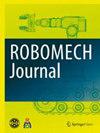Development of a continuum robot enhanced with distributed sensors for search and rescue
IF 1.7
Q3 INSTRUMENTS & INSTRUMENTATION
引用次数: 10
Abstract
Continuum robots can enter narrow spaces and are useful for search and rescue missions in disaster sites. The exploration efficiency at disaster sites improves if the robots can simultaneously acquire several pieces of information. However, a continuum robot that can simultaneously acquire information to such an extent has not yet been designed. This is because attaching multiple sensors to the robot without compromising its body flexibility is challenging. In this study, we installed multiple small sensors in a distributed manner to develop a continuum-robot system with multiple information-gathering functions. In addition, a field experiment with the robot demonstrated that the gathered multiple information has a potential to improve the searching efficiency. Concretely, we developed an active scope camera with sensory functions, which was equipped with a total of 80 distributed sensors, such as inertial measurement units, microphones, speakers, and vibration sensors. Herein, we consider space-saving, noise reduction, and the ease of maintenance for designing the robot. The developed robot can communicate with all the attached sensors even if it is bent with a minimum bending radius of 250 mm. We also developed an operation interface that integrates search-support technologies using the information gathered via sensors. We demonstrated the survivor search procedure in a simulated rubble environment of the Fukushima Robot Test Field. We confirmed that the information provided through the operation interface is useful for searching and finding survivors. The limitations of the designed system are also discussed. The development of such a continuum robot system, with a great potential for several applications, extends the application of continuum robots to disaster management and will benefit the community at large.基于分布式传感器的连续体搜救机器人的研制
Continuum机器人可以进入狭窄的空间,在灾难现场的搜索和救援任务中非常有用。如果机器人能够同时获取多个信息,则可以提高灾害现场的勘探效率。然而,目前还没有一种连续体机器人能够同时获取如此程度的信息。这是因为在不影响其身体灵活性的情况下给机器人安装多个传感器是一项挑战。在这项研究中,我们以分布式的方式安装了多个小型传感器,以开发具有多种信息收集功能的连续机器人系统。此外,机器人的现场实验表明,收集到的多重信息有可能提高搜索效率。具体而言,我们开发了一种具有传感功能的主动瞄准镜相机,该相机配备了总共80个分布式传感器,如惯性测量单元、麦克风、扬声器和振动传感器。在设计机器人时,我们考虑了节省空间、降低噪音和易于维护。开发的机器人即使弯曲,最小弯曲半径为250毫米,也可以与所有附加的传感器进行通信。我们还开发了一个操作界面,利用传感器收集的信息集成了搜索支持技术。我们在模拟福岛机器人试验场的废墟环境中演示了幸存者搜索程序。我们确认通过操作界面提供的信息对搜索和寻找幸存者是有用的。本文还讨论了所设计系统的局限性。这种连续体机器人系统的开发具有多种应用的巨大潜力,扩展了连续体机器人在灾害管理中的应用,并将使整个社会受益。
本文章由计算机程序翻译,如有差异,请以英文原文为准。
求助全文
约1分钟内获得全文
求助全文
来源期刊

ROBOMECH Journal
Mathematics-Control and Optimization
CiteScore
3.20
自引率
7.10%
发文量
21
审稿时长
13 weeks
期刊介绍:
ROBOMECH Journal focuses on advanced technologies and practical applications in the field of Robotics and Mechatronics. This field is driven by the steadily growing research, development and consumer demand for robots and systems. Advanced robots have been working in medical and hazardous environments, such as space and the deep sea as well as in the manufacturing environment. The scope of the journal includes but is not limited to: 1. Modeling and design 2. System integration 3. Actuators and sensors 4. Intelligent control 5. Artificial intelligence 6. Machine learning 7. Robotics 8. Manufacturing 9. Motion control 10. Vibration and noise control 11. Micro/nano devices and optoelectronics systems 12. Automotive systems 13. Applications for extreme and/or hazardous environments 14. Other applications
 求助内容:
求助内容: 应助结果提醒方式:
应助结果提醒方式:


